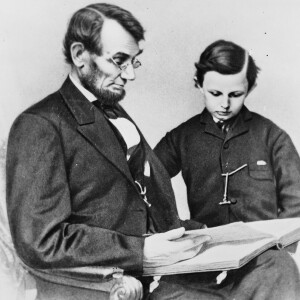
A speech that still gives me chills. I initially discovered it by accident via Babylon 5, as Sheridan quotes it. Given at the height of the civil war, it's the ultimate rallying cry. "We shall nobly save, or meanly lose, the last, best hope of Earth"
Fellow-Citizens of the Senate and House of Representatives:
Since your last annual assembling another year of health and bountiful harvests has passed, and while it has not pleased the Almighty to bless us with a return of peace, we can but press on, guided by the best light He gives us, trusting that in His own good time and wise way all will yet be well.
The correspondence touching foreign affairs which has taken place during the last year is herewith submitted, in virtual compliance with a request to that effect made by the House of Representatives near the close of the last session of Congress. If the condition of our relations with other nations is less gratifying than it has usually been at former periods, it is certainly more satisfactory than a nation so unhappily distracted as we are might reasonably have apprehended. In the month of June last there were some grounds to expect that the maritime powers which at the beginning of our domestic difficulties so unwisely and unnecessarily, as we think, recognized the insurgents as a belligerent would soon recede from that position, which has proved only less injurious to themselves than to our own country. But the temporary reverses which afterwards befell the national arms, and which were exaggerated by our own disloyal citizens abroad, have hitherto delayed that act of simple justice.
The civil war, which has so radically changed for the moment the occupations and habits of the American people, has necessarily disturbed the social condition and affected very deeply the prosperity of the nations with which we have carried on a commerce that has been steadily increasing throughout a period of half a century. It has at the same time excited political ambitions and apprehensions which have produced a profound agitation throughout the civilized world. In this unusual agitation we have forborne from taking part in any controversy between foreign states and between parties or factions in such states. We have attempted no propagandism and acknowledged no revolution. But we have left to every nation the exclusive conduct and management of its own affairs. Our struggle has been, of course, contemplated by foreign nations with reference less to its own merits than to its supposed and often exaggerated effects and consequences resulting to those nations themselves. Nevertheless, complaint on the part of this Government, even if it were just, would certainly be unwise. The treaty with Great Britain for the suppression of the slave trade has been put into operation with a good prospect of complete success. It is an occasion of special pleasure to acknowledge that the execution of it on the part of Her Majesty's Government has been marked with a jealous respect for the authority of the United States and the rights of their moral and loyal citizens.
I do not forget the gravity which should characterize a paper addressed to the Congress of the nation by the Chief Magistrate of the nation, nor do I forget that some of you are my seniors, nor that many of you have more experience than I in the conduct of public affairs. Yet I trust that in view of the great responsibility resting upon me you will perceive no want of respect to yourselves in any undue earnestness I may seem to display.
Is it doubted, then, that the plan I propose, if adopted, would shorten the war, and thus lessen its expenditure of money and of blood? Is it doubted that it would restore the national authority and national prosperity and perpetuate both indefinitely? Is it doubted that we here--Congress and Executive can secure its adoption? Will not the good people respond to a united and earnest appeal from us? Can we, can they, by any other means so certainly or so speedily assure these vital objects? We can succeed only by concert. It is not "Can any of us imagine better?" but "Can we all do better?" Object whatsoever is possible, still the question recurs, "Can we do better?" The dogmas of the quiet past are inadequate to the stormy present. The occasion is piled high with difficulty, and we must rise with the occasion. As our case is new, so we must think anew and act anew. We must disenthrall ourselves, and then we shall save our country.
Fellow-citizens, we cannot escape history. We of this Congress and this Administration will be remembered in spite of ourselves. No personal significance or insignificance can spare one or another of us. The fiery trial through which we pass will light us down in honor or dishonor to the latest generation. We say we are for the Union. The world will not forget that we say this. We know how to save the Union. The world knows we do know how to save it. We, even we here, hold the power and bear the responsibility. In giving freedom to the slave we assure freedom to the free--honorable alike in what we give and what we preserve. We shall nobly save or meanly lose the last best hope of earth. Other means may succeed; this could not fail. The way is plain, peaceful, generous, just--a way which if followed the world will forever applaud and God must forever bless.
No comments yet. Be the first to say something!